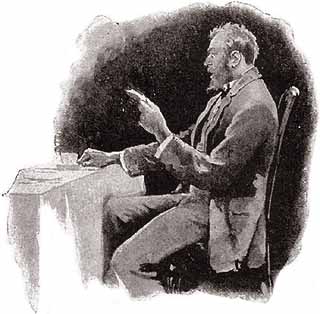| オレンジの種五つ 4 | オレンジの種五つ 5 |
“When my father took over the Horsham property, he, at my request, made a careful examination of the attic, which had been always locked up. We found the brass box there, although its contents had been destroyed. On the inside of the cover was a paper label, with the initials of K. K. K. repeated upon it, and ‘Letters, memoranda, receipts, and a register’ written beneath. These, we presume, indicated the nature of the papers which had been destroyed by Colonel Openshaw. For the rest, there was nothing of much importance in the attic save a great many scattered papers and note-books bearing upon my uncle’s life in America. Some of them were of the war time and showed that he had done his duty well and had borne the repute of a brave soldier. Others were of a date during the reconstruction of the Southern states, and were mostly concerned with politics, for he had evidently taken a strong part in opposing the carpet-bag politicians who had been sent down from the North. | 「私の父がホーシャムの屋敷を引き継いだとき / 父は、私の求めで / 屋根裏部屋を詳しく調べました / いつも鍵が掛けられていた◆真鍮の箱はそこにありました / しかしその中身は破棄されていました◆内側には紙のラベルが貼ってあり / K.K.K.の頭文字が◆そこに書かれていました / それから / 『手紙 / 覚書 / 領収書 / 目録』 / と下に書かれていました◆これらは / 推測では / 書類の種類を示している / 伯父によって焼き捨てられた◆それ以外は / 大して重要なものは屋根裏部屋にはありませんでした / ただおびただしい数のノートと書類が散らばっていました / アメリカでの伯父の生活に関することが書いてる◆戦時の頃のものもあり / それは示していました / それは彼がよく任務を果たしたこと / 勇敢な戦士だという評判をとっていたことを◆それ以外に南部諸州の再建期の日付のものがあり / おもに政治に関するものでした / 伯父は明らかに強固に反対した / 北部から送り込まれた渡りの政治家に対し」 |
“Well, it was the beginning of ’84 when my father came to live at Horsham, and all went as well as possible with us until the January of ’85. On the fourth day after the new year I heard my father give a sharp cry of surprise as we sat together at the breakfast-table. There he was, sitting with a newly opened envelope in one hand and five dried orange pips in the outstretched palm of the other one. He had always laughed at what he called my cock-and-bull story about the colonel, but he looked very scared and puzzled now that the same thing had come upon himself. | 「さて / 1884年の初めの頃でした / 父がホーシャムに住むようになったのは / そして全てはこの上なく順調でした / 1885年の1月までは◆年も明けて4日目のこと / 私は父が驚いて甲高く叫ぶのを聞いた / 私たちが一緒に朝食の席についている時◆父は / 開けたばかりの封筒を手に / そして5個の乾いたオレンジの種を差し出した別の手の平に◆父はいつも笑っていました / 伯父に関する話は私のでたらめな話だと言って / しかし今父は非常に恐れ当惑して見えました / 自分自身の身に同じことが起きて」 |
 | |
“‘Why, what on earth does this mean, John?’ he stammered. | 「『なぜだ / いったいこれはどういう意味だ / ジョン?』 / 父は口ごもりながら言った」 |
“My heart had turned to lead. ‘It is K. K. K.,’ said I. | 「私の心は鉛になっていた◆『K.K.K.だ』 / 私は言いました」 |
“He looked inside the envelope. ‘So it is,’ he cried. ‘Here are the very letters. But what is this written above them?’ | 「父は封筒の中を覗き込みました◆『そうだ』 / 父は叫びました◆『ここにそう書いてある◆しかしその上に書いてあるのは何だ?』」 |
“‘Put the papers on the sundial,’ I read, peeping over his shoulder. | 「『書類を日時計の上に置け』 / 私は読みました / 肩越しに覗き込んで」 |
“‘What papers? What sundial?’ he asked. | 「『なんの書類だ? / 日時計とはなんだ?』 / 父は訊きました」 |
“‘The sundial in the garden. There is no other,’ said I; ‘but the papers must be those that are destroyed.’ | 「『庭に日時計があります◆他にはありません』 / 私は言いました / しかし書類は破棄されたものに違いありません」 |
“‘Pooh!’ said he, gripping hard at his courage. ‘We are in a civilized land here, and we can’t have tomfoolery of this kind. Where does the thing come from?’ | 「『フン!』 / 父は言いました / 勇気を振り絞って◆『ここは文明社会だ / こんな馬鹿な真似が許されるはずがない◆これはどこから来たんだ?』」 |
“‘From Dundee,’ I answered, glancing at the postmark. | 「『ダンディーから』 / 私は答えました / 消印を見ながら」 |
“‘Some preposterous practical joke,’ said he. ‘What have I to do with sundials and papers? I shall take no notice of such nonsense.’ | 「『非常識な冗談だ』 / 父は言いました◆『日時計と書類でなにをせにゃならんのだ? / こんなたわごとには付き合わん』」 |
“‘I should certainly speak to the police,’ I said. | 「『これは絶対に警察に届けなければ』 / 私は言いました」 |
“‘And be laughed at for my pains. Nothing of the sort.’ | 「『無駄に笑われるだけだ◆届けるような物では全くない』」 |
“‘Then let me do so?’ | 「『では私に届けさせてもらえますか?』」 |
“‘No, I forbid you. I won’t have a fuss made about such nonsense.’ | 「『だめだ / 許さん◆わしはこんなたわごとで大騒ぎはせん』」 |
“It was in vain to argue with him, for he was a very obstinate man. I went about, however, with a heart which was full of forebodings. | 「父と議論しても無駄でした / 彼は非常に頑固な人間で◆私は暮らしていました / しかし / 胸騒ぎがいっぱいの心で」 |
“On the third day after the coming of the letter my father went from home to visit an old friend of his, Major Freebody, who is in command of one of the forts upon Portsdown Hill. I was glad that he should go, for it seemed to me that he was farther from danger when he was away from home. In that, however, I was in error. Upon the second day of his absence I received a telegram from the major, imploring me to come at once. My father had fallen over one of the deep chalk-pits which abound in the neighbourhood, and was lying senseless, with a shattered skull. I hurried to him, but he passed away without having ever recovered his consciousness. He had, as it appears, been returning from Fareham in the twilight, and as the country was unknown to him, and the chalk-pit unfenced, the jury had no hesitation in bringing in a verdict of ‘death from accidental causes.’ Carefully as I examined every fact connected with his death, I was unable to find anything which could suggest the idea of murder. There were no signs of violence, no footmarks, no robbery, no record of strangers having been seen upon the roads. And yet I need not tell you that my mind was far from at ease, and that I was well-nigh certain that some foul plot had been woven round him. | 「手紙が来てから三日目 / 父は古い友人のフリーボディ少佐に会いに家を出ました / 彼はポーツタウン・ヒルにある砦の一つを指揮していました◆私は父が出かけるのが嬉しかった / 私には父が危険から遠ざかるような気がしたからです / 父が家から離れていると◆しかし、それは / 間違いでした◆父が家を空けてから二日目に / 私は少佐から電報を受け取りました / すぐに私に来いという◆父は深い白亜坑の一つに落ちていました / このあたりに沢山ある / そして意識不明で横たえられていました / 頭蓋骨を粉砕されて◆私は父の元に急ぎました / しかし父は意識を取り戻すことなく亡くなりました◆父は / どうやら / 夕暮れ時にフェアラムから戻ろうとして / そして父には土地勘のない場所で / そして白亜坑には柵がないので / 陪審員はためらうことなく『不慮の事故死』という評決を下しました / 私は父の死に関係する事実を慎重に調べましたが / 他殺を思わせるものは何も見つけられませんでした◆暴行の跡はなく / 足跡もなく / 盗まれたものはなく / 見知らぬ人間が道で目撃されたという記録もありませんでした◆しかし、言うまでもないでしょうが / 私の心は決して休まりませんでした / そして私には完全に確信がありました / なんらかの邪悪な企みに父は捕らえられたのだと」 |
| オレンジの種五つ 4 | オレンジの種五つ 5 |